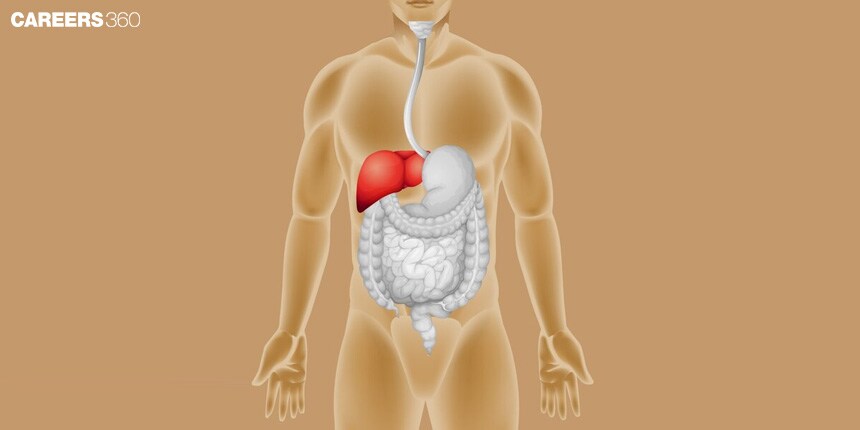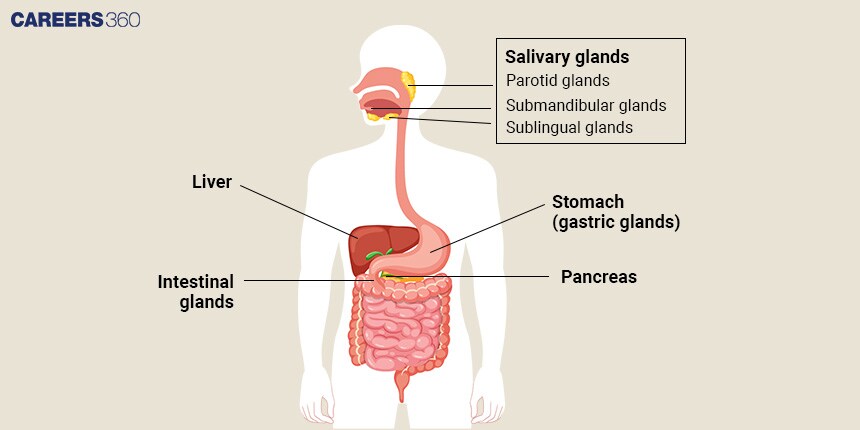1. What are the major digestive glands in the human body?
The main digestive glands are salivary glands, gastric glands, pancreas, liver, gallbladder, and intestinal glands.
2. How is the pancreas associated with digestion?
The digestive enzymes obtained from the pancreas are trypsin, lipase, and amylase. The hormones absorbed from it are insulin and glucagon.
3. What role do the salivary glands play as far as digestion is concerned?
Salivary glands produce saliva that carries the enzyme amylase. This enzyme starts digestion by breaking down carbohydrates into simple sugars for them to be absorbed.
4. What are common disorders of the liver?
Common disorders involving the organ include hepatitis, cirrhosis, and a fatty liver.
5. How does one maintain digestive gland health?
Most dietary recommendations will help keep digestive glands in proper working order if one adheres to them. These include adequate intake of a balanced diet, adequate hydration of the body, regular exercise, avoiding excessive alcohol consumption, and regular visits to the doctor.
6. What is the importance of intrinsic factor produced by gastric glands?
Intrinsic factor, produced by parietal cells in gastric glands, is crucial for the absorption of vitamin B12 in the small intestine. It binds to vitamin B12, protecting it from degradation in the digestive tract and enabling its absorption in the ileum. Without intrinsic factor, vitamin B12 deficiency (pernicious anemia) can occur.
7. What is the enteric nervous system and how does it relate to digestive glands?
The enteric nervous system is a network of neurons in the digestive tract often called the "second brain." It regulates digestive processes, including the secretion of digestive juices from various glands. This system can function independently of the central nervous system, allowing for local control of digestion.
8. How does the feedback mechanism work in controlling digestive gland secretions?
Feedback mechanisms control digestive gland secretions through hormonal and neural pathways. For instance, when the stomach becomes too acidic, this inhibits further acid production. Similarly, the presence of nutrients in the small intestine triggers hormones that regulate pancreatic secretions and slow gastric emptying, allowing for efficient digestion.
9. What is the role of secretin in pancreatic secretion?
Secretin is a hormone released by the small intestine in response to acidic chyme. It stimulates the pancreas to produce a bicarbonate-rich fluid that neutralizes stomach acid in the duodenum. This creates an optimal pH for pancreatic enzymes to function and protects the intestinal lining from acid damage.
10. What is the role of gastrin in stomach gland function?
Gastrin is a hormone produced by G cells in the stomach and duodenum. It stimulates the secretion of gastric acid by parietal cells, promotes the growth of the stomach lining, and increases the motility of the stomach. Gastrin release is triggered by the presence of food in the stomach, especially proteins.
11. How does the salivary gland contribute to digestion?
Salivary glands contribute to digestion by producing saliva, which contains the enzyme amylase. Amylase begins breaking down carbohydrates in the mouth. Saliva also moistens food, making it easier to swallow, and contains antibacterial compounds that help protect against oral infections.
12. What is the role of the pancreas in digestion?
The pancreas plays a dual role in digestion. As an exocrine gland, it produces pancreatic juice containing various enzymes (like amylase, lipase, and proteases) that break down carbohydrates, fats, and proteins. As an endocrine gland, it produces hormones like insulin and glucagon that regulate blood sugar levels.
13. How does the liver assist in digestion?
The liver aids digestion by producing bile, a greenish-yellow fluid that emulsifies fats, breaking them into smaller droplets. This increases the surface area of fats, making them easier for lipase enzymes to break down. The liver also stores and processes nutrients absorbed from the intestines.
14. What is the function of the gallbladder in the digestive system?
The gallbladder stores and concentrates bile produced by the liver. When fatty foods enter the small intestine, the gallbladder contracts and releases bile through the bile duct. This concentrated bile helps emulsify fats more effectively than the continuous, dilute secretion from the liver alone.
15. How do gastric glands in the stomach contribute to digestion?
Gastric glands in the stomach lining produce gastric juice, which contains hydrochloric acid and pepsinogen. The acid creates an optimal pH for pepsin (activated from pepsinogen) to begin protein digestion. It also kills many ingested microorganisms and helps absorb certain minerals.
16. What is the difference between endocrine and exocrine glands in the digestive system?
Endocrine glands, like parts of the pancreas, secrete hormones directly into the bloodstream to regulate digestive processes. Exocrine glands, such as salivary glands and most of the pancreas, release their secretions through ducts into the digestive tract to directly aid in breaking down food.
17. How do intestinal glands (crypts of Lieberkühn) contribute to digestion?
Intestinal glands, also known as crypts of Lieberkühn, are located in the lining of the small and large intestines. They secrete intestinal juice containing enzymes like enterokinase, which activates trypsinogen from the pancreas. They also produce mucus to lubricate the intestinal walls and protect against acidic chyme.
18. What is the significance of goblet cells in the digestive system?
Goblet cells are specialized epithelial cells found throughout the digestive tract. They secrete mucus, which lubricates the passage of food, protects the lining of the digestive tract from mechanical and chemical damage, and provides a habitat for beneficial gut bacteria.
19. How do Brunner's glands contribute to digestion?
Brunner's glands, located in the submucosa of the duodenum, produce an alkaline mucus that helps neutralize stomach acid entering the small intestine. This protects the intestinal lining and creates a suitable pH for pancreatic enzymes to function optimally.
20. How does the acidic environment created by stomach glands affect protein digestion?
The acidic environment (pH around 2) created by stomach glands serves multiple purposes in protein digestion. It denatures proteins, unfolding them to expose more surface area for enzyme action. It also activates pepsinogen into pepsin, the main protein-digesting enzyme in the stomach, which works best in acidic conditions.
21. What are digestive glands and why are they important?
Digestive glands are specialized organs that produce and secrete substances essential for breaking down food. They are crucial because they produce enzymes, acids, and other chemicals that help transform complex food molecules into simpler forms that can be absorbed by the body. Without digestive glands, our bodies would be unable to extract nutrients from the food we eat.
22. How do digestive glands respond to different types of food?
Digestive glands respond to different foods through various mechanisms. For example, the sight, smell, or thought of food triggers salivary glands (cephalic phase). The presence of food in the stomach stimulates gastric gland secretion (gastric phase). Different nutrients in the small intestine trigger specific hormonal responses, like fat stimulating CCK release (intestinal phase).
23. How do digestive glands contribute to maintaining the gut microbiome?
Digestive glands contribute to the gut microbiome in several ways. The mucus produced by goblet cells provides a habitat for beneficial bacteria. Bile acids from the liver can influence microbial composition. Additionally, the slightly alkaline environment created by pancreatic secretions in the small intestine supports the growth of certain beneficial bacteria.
24. How do digestive glands adapt to changes in diet?
Digestive glands can adapt to changes in diet over time. For example, people who switch to a high-fiber diet may experience an increase in the production of certain digestive enzymes. Similarly, the composition of bile can change in response to long-term dietary changes, such as increased cholesterol intake.
25. What is the significance of the sphincter of Oddi in relation to digestive glands?
The sphincter of Oddi is a muscular valve that controls the flow of bile and pancreatic juices into the duodenum. It regulates the release of these important digestive fluids, preventing reflux into the pancreatic and bile ducts. The sphincter's function is coordinated with digestive processes to ensure optimal timing of enzyme and bile release.
26. What is the role of cholecystokinin (CCK) in relation to digestive glands?
Cholecystokinin (CCK) is a hormone released by cells in the small intestine when fatty foods are present. It stimulates the gallbladder to contract and release bile, and signals the pancreas to secrete digestive enzymes. CCK also slows stomach emptying, allowing more time for digestion.
27. How do digestive glands contribute to the body's defense against pathogens?
Digestive glands contribute to defense against pathogens in several ways. Salivary glands produce lysozyme, an enzyme that can break down bacterial cell walls. The acidic environment created by gastric glands kills many ingested microorganisms. Pancreatic juice and bile also have antimicrobial properties, helping to maintain a balanced gut microbiome.
28. What is the role of somatostatin in regulating digestive gland function?
Somatostatin is a hormone produced by D cells in the pancreas and stomach. It acts as a general inhibitor of other digestive hormones, including gastrin, cholecystokinin, and secretin. This helps to fine-tune the digestive process, preventing over-secretion of digestive juices and regulating the rate of digestion.
29. How do age-related changes affect digestive gland function?
As we age, digestive gland function can decline. This may include reduced production of stomach acid, decreased enzyme secretion from the pancreas, and less efficient bile production. These changes can lead to slower digestion, increased risk of nutrient deficiencies, and greater susceptibility to gastrointestinal infections in older adults.
30. What is the connection between digestive glands and the immune system?
Digestive glands play a crucial role in supporting the immune system. The mucus produced by various glands forms a physical barrier against pathogens. Gut-associated lymphoid tissue (GALT) interacts closely with glandular secretions. Additionally, the maintenance of a healthy gut microbiome through glandular secretions indirectly supports overall immune function.
31. How do digestive glands contribute to the absorption of fat-soluble vitamins?
Digestive glands, particularly the liver and pancreas, are crucial for fat-soluble vitamin absorption. The liver produces bile, which emulsifies fats, creating small droplets. The pancreas secretes lipase, which breaks down these fat droplets. This process is essential for the absorption of fat-soluble vitamins (A, D, E, K) in the small intestine.
32. What is the role of chief cells in gastric glands?
Chief cells, found in gastric glands of the stomach, produce and secrete pepsinogen, the inactive precursor of the enzyme pepsin. When pepsinogen comes into contact with the acidic environment of the stomach, it is converted to pepsin, which begins the process of protein digestion.
33. How do hormones like ghrelin and leptin interact with digestive glands?
Ghrelin, produced by the stomach, stimulates appetite and can increase gastric acid secretion. Leptin, produced by fat cells, suppresses appetite and can influence digestive gland function. These hormones interact with the digestive system to regulate food intake and energy balance, affecting the activity of various digestive glands.
34. What is the significance of the ductal system in exocrine digestive glands?
The ductal system in exocrine digestive glands is crucial for delivering secretions to the digestive tract. It not only transports enzymes and other substances but also modifies the composition of the secretions. For example, pancreatic ducts add bicarbonate to pancreatic juice, while salivary ducts can modify the ionic composition of saliva.
35. How do digestive glands contribute to water balance in the body?
Digestive glands play a significant role in water balance. They secrete large volumes of fluids daily (e.g., saliva, gastric juice, bile, pancreatic juice), which are mostly reabsorbed in the intestines. This process helps maintain hydration and electrolyte balance. Additionally, the colon can adjust water reabsorption based on the body's needs.
36. What is the role of enterochromaffin cells in the digestive system?
Enterochromaffin cells, found in the epithelium of the digestive tract, are a type of enteroendocrine cell. They produce and release serotonin, which plays various roles in digestion, including regulating intestinal motility, secretion, and sensation. Serotonin also acts as a signaling molecule between the gut and the nervous system.
37. How do digestive glands contribute to the regulation of blood glucose levels?
Digestive glands, particularly the pancreas, play a crucial role in regulating blood glucose. The pancreas produces insulin and glucagon, hormones that lower and raise blood glucose respectively. Additionally, other digestive hormones like GIP (glucose-dependent insulinotropic peptide) from the small intestine can influence insulin secretion and glucose metabolism.
38. What is the significance of the gradient of digestive enzymes along the small intestine?
There is a gradient of digestive enzyme activity along the small intestine. Enzymes like lactase and sucrase are more abundant in the proximal small intestine, while others like peptidases are more evenly distributed. This gradient allows for efficient digestion as food moves through the intestine, with different nutrients being broken down at optimal locations.
39. How do digestive glands contribute to the body's pH balance?
Digestive glands play a significant role in maintaining pH balance. The stomach produces hydrochloric acid, creating a highly acidic environment. In contrast, the pancreas secretes bicarbonate-rich fluids to neutralize this acid in the small intestine. This interplay helps maintain the proper pH for optimal enzyme function and protects the intestinal lining.
40. What is the role of melatonin produced by digestive glands?
Melatonin, traditionally associated with sleep regulation, is also produced by cells in the digestive tract. In the gut, melatonin acts as an antioxidant, helps regulate motility, and may play a role in reducing inflammation. It also interacts with the gut microbiome and may influence the secretion of other digestive hormones.
41. How do digestive glands adapt to fasting and starvation?
During fasting or starvation, digestive glands adapt to conserve energy and resources. Secretion of digestive juices decreases, and the stomach reduces acid production. The gallbladder may enlarge to store more concentrated bile. These adaptations help preserve the digestive system's functionality while minimizing energy expenditure.
42. What is the role of the diffuse endocrine system in the digestive tract?
The diffuse endocrine system in the digestive tract consists of hormone-producing cells scattered throughout the gut lining. These cells, including those that produce serotonin, cholecystokinin, and secretin, play crucial roles in regulating digestion, appetite, and gut motility. They form an important part of the gut-brain axis, influencing both digestive and systemic functions.
43. How do digestive glands contribute to the body's circadian rhythms?
Digestive glands exhibit circadian rhythms in their function. For example, gastric acid secretion tends to be higher at night, while pancreatic enzyme secretion peaks during the day. These rhythms are influenced by and contribute to the body's overall circadian clock, affecting digestion efficiency, appetite, and metabolism throughout the day.
44. What is the significance of the gut-brain axis in relation to digestive gland function?
The gut-brain axis refers to the bidirectional communication between the digestive system and the central nervous system. Digestive glands play a crucial role in this axis, producing hormones and neurotransmitters that can influence brain function. Conversely, stress and emotions can affect digestive gland secretions, demonstrating the close relationship between mental state and digestive function.
45. How do digestive glands contribute to the sensation of satiety?
Digestive glands contribute to satiety through various mechanisms. The release of cholecystokinin (CCK) from the small intestine in response to food intake signals fullness to the brain. Leptin, produced by fat cells, also influences satiety. The stretching of the stomach and the presence of nutrients trigger the release of hormones that promote feelings of fullness and reduce appetite.
46. What is the role of gastric lipase in fat digestion?
Gastric lipase, produced by chief cells in the stomach, begins the process of fat digestion. While its activity is limited compared to pancreatic lipase, it is particularly important for infants whose pancreatic function is not fully developed. In adults, gastric lipase helps to initiate fat breakdown, preparing lipids for further digestion in the small intestine.
47. How do digestive glands contribute to the absorption of vitamin B12?
Digestive glands play a crucial role in vitamin B12 absorption. Parietal cells in the stomach produce intrinsic factor, which binds to vitamin B12. This complex is then absorbed in the ileum. Without intrinsic factor, vitamin B12 cannot be effectively absorbed, leading to deficiency. Pancreatic enzymes also help release vitamin B12 from food proteins.


